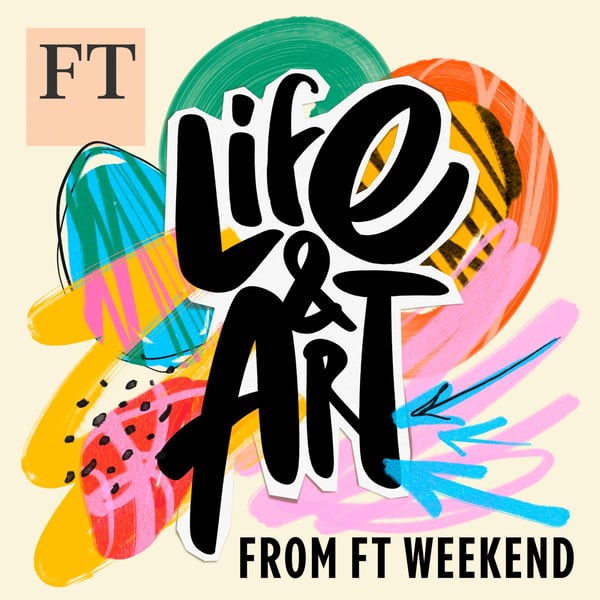Her parents fled Iran. Her art tells their story
Life and Art from FT Weekend
Forhecz Topher
4.6 • 601 Ratings
🗓️ 12 May 2023
⏱️ 23 minutes
🧾️ Download transcript
Summary
This week, we speak with artist Sheida Soleimani. Soleimani grew up in the American Midwest hearing stories of her parents’ escape from Iran: her father spending years in hiding, her mother imprisoned in solitary confinement. Now, she is using three-dimensional collages to tell their story. And she’s doing it in collaboration with them.
--------------
Want to say hi? We love hearing from you. Email us at [email protected]. We’re on Twitter @ftweekendpod, and Lilah is on Instagram and Twitter @lilahrap.
--------------
Links:
– Lilah’s profile of Sheida Soleimani, from the FT Weekend Magazine’s recent photography special: https://on.ft.com/3MjCQTB
– You can explore Ghostwriter on the Edel Assanti website. It’s on view at their gallery in London until May 13: https://edelassanti.com/exhibitions/115-sheida-soleimani-ghostwriter/
– Sheida Soleimani’s 2021 work Proof: https://dennygallery.com/artists/sheida-soleimani/
– Ghostwriter will be on view at the Denny Gallery in Manhattan in September
– Sheida is on Instagram at @sheidajanam
--------------
Our US edition of the FTWeekend Festival is back! Join Hillary Clinton, Jamie Lee Curtis, Ta-Nehisi Coates, Alice Waters, your favourite FT writers, and more on May 20 in Washington, DC, and online. Register now and save $20 using the promo code weekendpodcast at ft.com/festival-us
Special offers for Weekend listeners, from 50% off a digital subscription to a $1/£1/€1 trial are here: http://ft.com/weekendpodcast.
--------------
Original music by Metaphor Music. Mixing and sound design by Breen Turner and Sam Giovinco.
Read a transcript of this episode on FT.com
Hosted on Acast. See acast.com/privacy for more information.
Transcript
Click on a timestamp to play from that location
| 0:00.0 | So we see this photographic image of this mud brick-looking house in the ruin. |
| 0:07.6 | It's, you know, it looks a little, it's in shambles. |
| 0:10.1 | These are the ruins of the house that my mother grew up in. |
| 0:13.1 | That's the artist Sheda Soleimani. |
| 0:15.4 | Recently, I joined her at the Denny Gallery in Tribeca, New York, where we could look at her art together. |
| 0:54.9 | Her newest work is art about her parents' escape from Iran in the 1980s. It's actually a very collaborative practice. So, you know, I'll be like, oh, I remember the story you told me, and this is what I'm thinking of putting into the set, or this is what I'm putting in the background, and I'll describe it to him, and I'll be like, oh, this sounds good, except you left out this detail, and you should add this because it's a very important element. Sheda is talking me through this series, which we featured recently in the photography special of the FT Weekend magazine. It's called Ghost Writer, and the story it's telling is a difficult one. |
| 1:01.4 | As an opponent of the Iranian Revolution, Sheda's father spent several years in hiding, and her mother spent over a year imprisoned in solitary confinement. The project's name comes from the |
| 1:08.1 | early 2000s. Her dad noticed that ghostwritten immigrant stories were having a |
| 1:12.6 | moment in American culture. I remember my dad was like really excited about that at the moment and was |
| 1:18.1 | like, Sheda, Papa, we should find a ghostwriter to write a story about our life. And I knew that |
| 1:24.6 | he would never do it. And lo and behold, he never did. And so I remember calling them and asking them after a lot of thought, |
| 1:31.1 | is it okay if I go straight your story in photographs? |
| 1:34.1 | And they said yes. |
| 1:35.3 | And they said, under one condition, our faces remain anonymous. |
| 1:38.7 | And I said, absolutely, you know, thinking about also how I experience |
| 1:42.2 | and think about the medium of photography, the faces aren't |
| 1:44.9 | important to me. People don't need to see faces to understand, like, you know, the trauma |
| 1:50.0 | that they've experienced or their pain or their stories. Shado was born and grew up in the U.S. |
| 1:56.4 | years after her parents escaped. She's 33, and until now, she's been making very political work. |
| 2:03.3 | A lot of it is about how the Middle East is represented in Western media. |
| 2:07.1 | But now she's finally telling this very personal story about how her parents left Iran. |
| 2:12.8 | And the best, sort of most comfortable way that she's found to do that is to work with her parents. |
... |
Please login to see the full transcript.
Disclaimer: The podcast and artwork embedded on this page are from Forhecz Topher, and are the property of its owner and not affiliated with or endorsed by Tapesearch.
Generated transcripts are the property of Forhecz Topher and are distributed freely under the Fair Use doctrine. Transcripts generated by Tapesearch are not guaranteed to be accurate.
Copyright © Tapesearch 2025.

